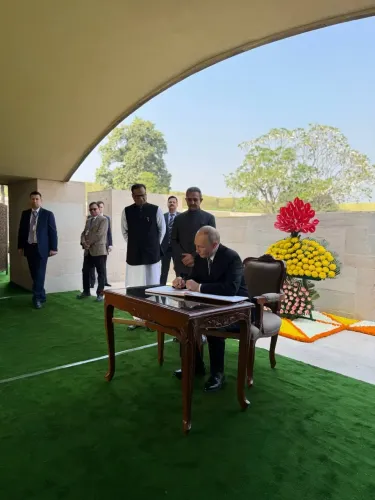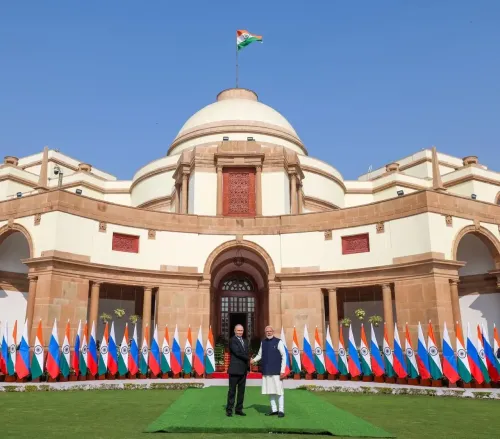How is Gujarat Police Enhancing Pilgrim Safety at Ambaji Temple with AI?

Synopsis
Key Takeaways
- AI surveillance enhances security at Ambaji temple.
- Real-time monitoring of crowd density improves safety.
- Integration with the State Crime Records Bureau helps identify criminals.
- Multiple advanced tools support round-the-clock policing.
- Ambaji temple holds significant cultural and economic importance.
Ahmedabad, Sep 3 (NationPress) With millions of devotees flocking to the Ambaji temple during the annual Bhadarvi Punam fair, the Banaskantha police in Gujarat have embraced artificial intelligence (AI) to bolster security and manage crowds effectively.
For the first time, AI-driven surveillance is being implemented at Ambaji to monitor suspicious activities, identify known offenders, locate missing persons, and assess crowd density in real-time.
A sophisticated control room has been established to monitor live feeds from CCTV and AI cameras positioned at strategic locations throughout the temple town, enabling law enforcement to respond swiftly to any incidents.
Banaskantha Superintendent of Police Prashant Sumbe stated that the incorporation of AI with CCTV has significantly improved safety for pilgrims. “The system cross-references faces with the State Crime Records Bureau to identify criminals and avert illegal activities. It also aids in estimating the number of visitors within the temple and helps manage crowds accordingly,” he noted.
Parking management is being optimized through the “Show My Parking” app, he added. Authorities have deployed a variety of advanced tools for continuous policing, including 12 people-counting cameras, 12 AI cameras, 20 solar-powered AI cameras, 90 body-worn cameras, vehicle-mounted cameras, and a crowd management system equipped with microphones and speakers.
All surveillance feeds are continuously monitored at the police control room to keep track of any potential threats. “The safety of the pilgrims is our utmost concern. Utilizing advanced technology will fortify our security measures,” SP Sumbe emphasized.
Located in Gujarat’s Banaskantha district, Ambaji is of profound political and social importance as one of the most venerated Shakti Peeths in India. The temple, dedicated to Goddess Amba, serves not only as a spiritual hub but also as a symbol of cultural unity, drawing devotees from Gujarat, Rajasthan, Madhya Pradesh, and beyond.
Historically, Ambaji has been a site of both resistance and faith, with rulers and political figures frequently invoking the deity to reinforce social and cultural identity. Its economic significance is noteworthy, as the pilgrimage supports livelihoods through tourism and commerce, while politically, mass gatherings at Ambaji exemplify the intersection of faith and governance, where issues of infrastructure, law and order, and public belief converge, making it a focal point in Gujarat’s socio-political landscape.










